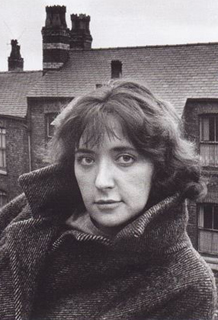
('Sunset over Matthias Court' © Tom Blackwell, 2007)
EVERYTHING MAKES ITS MARK: THE STORIES OF SHELAGH DELANEY
by DAVID FRANKEL
In 1938 Shelagh Delaney was born into the Salford depicted by L.S. Lowry: a city that was dirty and crumbling, but also dramatic and proud. Inevitably, the place made a very strong impression and this is reflected in her writing. She described it as,
A restless city, alive and dying in the same breath […] It’s the only place I can claim to know. A peculiar thing about Salford is it’s like a terrible drug […] you might want to get away from it, but you can’t. So you stay.
This restlessness manifests itself in Delaney’s prose writing which is characterised by brevity and concision. The stories play with structure and some are every bit as experimental and modernist as contemporaries such as Samuel Beckett.
Delaney seems to have been interested in stories from a very early age. Her father was an avid reader and storyteller, and she spent a lot of time at the cinema. Although her school career was initially unpromising, encouragement from her head teacher started an interest in drama and she quickly realised that she could write well. Despite this early promise, she left school at the age of sixteen and took a series of dead-end jobs. Her self-penned employment history could be from the life of one of her characters:
Saturday morning job in milk factory counting bottles. Asked to retire from position gracefully owing to inability to count correctly. On leaving school found job in gown shop – left voluntarily after one week’s service. Worked as usherette in Manchester Opera House – sacked for fraternising with actors […] Worked as photographer’s assistant until play, A Taste of Honey, made me rich and famous.
It is A Taste of Honey,written in 1958, for which she remains best known. It quickly became one of the defining plays (and later film) of the period — unique at the time in portraying northern working-class women from a working-class woman’s point of view. Her second play, The Lion in Love, from 1960, was a critical and commercial failure and Delaney’s only book of prose, Sweetly Sings the Donkey, was published in the aftermath.
Delaney was still only twenty-five when the collection came out, but it feels like the work of a much older writer. Broadly autobiographical, it follows the author’s life from early adolescence to her achieving success as a writer. In all of the early stories in the collection, the protagonists are children and outsiders, observers, separated from the others around them by their intelligence.
The first story, from which the collection takes its title, reflects Delaney’s experiences at a children’s convalescent home run by nuns at Lytham St Annes, on the coast. Observations and anecdotes are used to form an impressionistic image of the narrator’s life. The different sections of the story drift between diary-like entries and first-person present-tense descriptions portraying the narrator’s life as she is experiencing it.
Despite the maturity of her voice, her insecurity is revealed by how, in her mind, the tides seem to be perpetually on the verge of undermining the world of the sea-front convalescent home and washing it away:
…its owners have taken no notice of Jesus Christ’s warnings about putting up houses on sand, for this building has been out up on the beach and the downstairs rooms get flooded out every high tide and all surrounding the house and we inside it are sandhills…
In the opening story, the blinkered perspectives and experience of the nuns provides the stultifying backdrop for the young narrator who is constantly questioning and yearning to see other things: the book begins with the words, ‘I am here and I am safe and I am sick of it’, and with these words Delaney seems to be setting out her stall for the rest of the collection.
 The freshness of the writing implies that the stories are based partly on the scribblings from the notebooks Delaney carried through her teens, but the autobiographical ‘truth’ is in the emotional impact of the stories rather than the ‘facts’. The stories are underpinned by the grittiness of their surroundings, which give them the feeling of ‘real life’, but they are dramatic – never quite true. When asked where her stories came from Delaney replied, “I applied my imagination to my observation.” In ‘Sweetly Sings the Donkey’, this is echoed when one of the narrator’s friends tells her, “I’ve heard some of your true stories. You make them all up”, to which she replies, “They’re all based on the truth…” This is the spirit that the reader must approach the collection.
The freshness of the writing implies that the stories are based partly on the scribblings from the notebooks Delaney carried through her teens, but the autobiographical ‘truth’ is in the emotional impact of the stories rather than the ‘facts’. The stories are underpinned by the grittiness of their surroundings, which give them the feeling of ‘real life’, but they are dramatic – never quite true. When asked where her stories came from Delaney replied, “I applied my imagination to my observation.” In ‘Sweetly Sings the Donkey’, this is echoed when one of the narrator’s friends tells her, “I’ve heard some of your true stories. You make them all up”, to which she replies, “They’re all based on the truth…” This is the spirit that the reader must approach the collection.
The stories ‘Tom Riley’, ‘The Teacher’ and ‘Pavan for a Dead Prince’, which form the middle section of the collection, are the most ‘traditional’ stories in terms of structure and voice. The early stories in the collection are haunted by ever-present threats of death, illness and brutality. All have an underlying sadness and an element of impending tragedy that the reader senses almost from the first paragraph.
In ‘Tom Riley’, a delicate boy, ill-suited to the harshness of his city environment is bullied by other children. Perhaps the bleakest story in the collection, the boy’s weakness and the hostility of his surroundings give it a horrible sense of inevitability.
In most of Delaney’s Salford-soaked stories her characters are accepting of, or even thriving in, the dirty city streets, but in this story Salford and its pollution and violence are wholly malevolent.
The world view of the young Delaney is again revealed in ‘The Teacher’. The eponymous schoolmaster brutally pushes a lad to the limit in his quest to thrash conformity into his pupils: “There is no room for the outsider in life.”
This dark trio of stories from Delaney’s adolescence is interrupted by the gentle humour of ‘My Uncle the Spy’. It is only a page long but, like the best flash fiction, it reaches beyond itself, projecting into the past and the future. Humour is continually simmering in Delaney’s work – both the author and her characters are always ready for a comeback – it is a defence mechanism. But, as the implications of the brief story unfold, even here there is sadness present.
‘Pavan for a Dead Prince’ is a story about a young miner, the boyfriend of the story’s narrator (Delaney’s doppelganger) who discovers a love of flamenco dancing. The dancing provides something exuberant and beautiful amongst the dirt of his life as a miner, until he is stricken by rheumatic fever. Despite his weakened state, he is unable to give up dancing and this proves his final downfall.
The sad climax of the story is made more moving by the detached strength of the narrator. The final scene, the boy’s funeral, is evoked in Delaney’s most sparse prose:
–tragic –a young lad like that – good die young – his poor mother –what a waste.
But his face had shone again.
“What’s funny, kid?”
“Nothing.”
The characters in Delaney’s stories hope—believe—something better is possible. Her final smile carries the message of the story – in such a harsh place death comes randomly, but what really counts is how brightly you burn before it arrives.
The final stories, ‘All About and to a Female Artist’, ‘Vodka and Small Pieces of Gold’, and ‘The White Bus’, relate to Delaney’s life post-success, and were clearly conceived some years after the earlier stories. They are less rounded as stories, perhaps because they lack the perspective of hindsight, but each of them is interesting in its own right, and all play with structure.
‘All About and to a Female Artist’ is an avalanche of voices drawn from reviews and correspondence sent to the author following her rise to fame. The excerpts from her mail box are hostile, desperate, beseeching or downright bizarre: ‘I would like to know if you would let me write to you as a pen friend. I am 30 years old and play the harmonica…’
Delaney collages them into something which, although not actually a story, presents something that is larger than the sum of its parts. The text is selected and assembled, drawing out something like a collective voice.
Because of Delaney’s willingness to experiment with form, Sweetly Sings the Donkey was not well received critically. A review in the US newsweekly The Village Voice was fairly typical, describing the book as, ‘a grab-bag of bits and snatches, things and stuff, a collection of miscellany that for the most part might just as well been left unpublished.’ Delaney’s prose could be said to lack polish in some ways, but it maintains a sense of spontaneity and directness. The spare description and stripped-down dialogue are well suited to the subject matter. In some places this is taken to such an extent that the story is reduced to a play-like structure. In a 1959 interview with The Times, Delaney said, ‘I write as people talk’. As with her plays, the vitality of her stories comes from her extraordinary talent for dialogue. She captures the rhythm of rapid conversation between characters – the firing back and forth – and its underlying humour.
“Somewhere in the world at all hours of the day and night a nun or a monk is praying for the souls of men. Why are you looking at me so suspiciously?”
“I didn’t know I was.”
“You always have a funny look in your eyes.”
“I must have been born with it.”
“You must,” she said and tripped over the hem of her long black robe – “Oh, it’s a long road leading them Home,” she muttered.
“Yes it is, but if it was any shorter it wouldn’t reach the front door.”
Her use of language is strongly rooted in her Salford upbringing. She speaks about this aspect of her work in Ken Russell’s 1960 Monitor documentary: “The language is alive. It’s virile. It lives and it breathes and you know exactly where it’s coming from – right out of the earth.”
Like ‘All About and to a Female Artist’, the strength of ‘Vodka and Pieces of Gold’ comes from its ability to create a vivid evocation of people and voice rather than a concrete narrative. Rapidly shifting scenes and dialogue create an impressionist blur – a series of vignettes and broken conversations that chart Delaney’s trip to Poland.
This story, and arguably the whole collection, is a like string of encounters. Delaney’s landscape is not drawn by observations of the physical environment but people she sees along the way: a young couple leaving a museum, people on train, wealthy tourists in a café. As one might expect from such an accomplished playwright, it is the dialogue that sets the scene and moves the story forwards, both internally and geographically.
All of the stories in the collection are characterised by Delaney’s razor-like observation of human behaviour but, despite the sharpness of her intelligence, the stories are suffused with kindness. The observations she makes, however cutting, would not be possible without genuine empathy. Whether or not we like them, or agree with them, we sympathise with Delaney’s characters because she does. They are believable, familiar. Their weaknesses and strengths are our weaknesses and strengths. They are dysfunctional but striving for happiness.
 Delaney took no prisoners when it came to exposing hypocrisy and attacking the accepted norms of the period. Because her subjects were the people and the city around her, this led to a difficult relationship with her home town. The vitriol of the reaction of Salford’s establishment to Delaney’s work shouldn’t be underestimated. Salford Council and press orchestrated a campaign against her and, because of her class, lack of formal education, age and gender the resentment targeted at her was worsened. To some extent Delaney used her position as an outsider to market her work, but this was clever rather than cynical, not to mention necessary; anyone doubting the prejudice against her need only read reviews or listen to press interviews from the period. ‘The White Bus’ was almost certainly written as a response to the treatment she received from her home city.
Delaney took no prisoners when it came to exposing hypocrisy and attacking the accepted norms of the period. Because her subjects were the people and the city around her, this led to a difficult relationship with her home town. The vitriol of the reaction of Salford’s establishment to Delaney’s work shouldn’t be underestimated. Salford Council and press orchestrated a campaign against her and, because of her class, lack of formal education, age and gender the resentment targeted at her was worsened. To some extent Delaney used her position as an outsider to market her work, but this was clever rather than cynical, not to mention necessary; anyone doubting the prejudice against her need only read reviews or listen to press interviews from the period. ‘The White Bus’ was almost certainly written as a response to the treatment she received from her home city.
The final and most enigmatic story in the collection, ‘The White Bus’ is dreamlike in its telling, to the point of surrealism. After a train journey with rowdy football fans drowning their sorrows with stolen gin, the narrator becomes side tracked on her way home, boarding a tour bus taking in the sights of her city. The sightseers, accompanied by the mayor, visit factories, parks and housing estates: places that would have been familiar to anyone who knew Salford, re-painted as a hallucinatory backdrop to the surreal bus tour.
Almost unbelievably the council actually subsidised city bus tours, taking in all the newly built municipal sites, schools and factories, as a response to Delaney’s plays and the attention they received. The black humour that runs through ‘The White Bus’ exposes the hypocrisy of the puritanical establishment of the city and Delaney revels in the irony of the mayor inviting people to “See the city as it really is”.
During the tour the voice of the tour guide, extolling the city’s greatness, is constantly undermined by the Mayor’s mace-bearer who provides an alternative commentary reflecting the grittier reality of city life. When the bus arrives at the city’s park, the guide describes the noble history of the place, only to be interrupted by the mace bearer: “I was conceived there under a rhododendron bush – by the duck pond.”
When the story was made into a film by Lindsay Anderson in 1967, jointly scripted by Delaney, the Salford Reporter called it ‘Another slur on Salford’s good name’.
Delaney left Salford around the time Sweetly Sings the Donkey was published. She went on to have a successful career as a writer for television, film and radio. After her experiences at the hands of the press, she avoided the limelight for the rest of her life. (John Harding’s excellent 2014 biography, Sweetly Sings Delaney, is the first proper survey of Delaney’s early work and the media barrage that surrounded it.) Whether she intended it or not, the final vignette of the book is wonderfully poignant. The story’s narrator visits a café late at night. As she leaves, the owners, a husband and wife, are working late, singing to themselves as they clean their shop despite the fact that it has been scheduled for demolition. The collection ends with the words:
And the man, soon intoxicated with the rhythm, set himself to polishing and sweeping the condemned shop and I went away – murmuring.
~
 The twenty-fifth of November would have been Shelagh Delaney’s birthday. In honour of ‘Shelagh Delaney Day’, an annual celebration of her work which began in 2014, Salford Stories – An Anthology has been published. All of the stories in this collection were written by people who have a connection to Salford. They reflect Delaney’s interest in the people around her and the human experiences of the ordinary individual.
The twenty-fifth of November would have been Shelagh Delaney’s birthday. In honour of ‘Shelagh Delaney Day’, an annual celebration of her work which began in 2014, Salford Stories – An Anthology has been published. All of the stories in this collection were written by people who have a connection to Salford. They reflect Delaney’s interest in the people around her and the human experiences of the ordinary individual.
Like Delaney, David Frankel is an exiled native of Salford. He completed an MA in Creative Writing at the University of Chichester and was awarded the Kate Betts Memorial Prize. His stories have been published in anthologies and magazines including The London Magazine, Unthology 8, and Lightship Anthology. He has been short and longlisted for a number of prizes, including The Willesden Herald Short Story Prize, the Fish Memoir Prize and the Hilary Mantel Short Story Prize. When he isn’t writing, he works as an artist.

